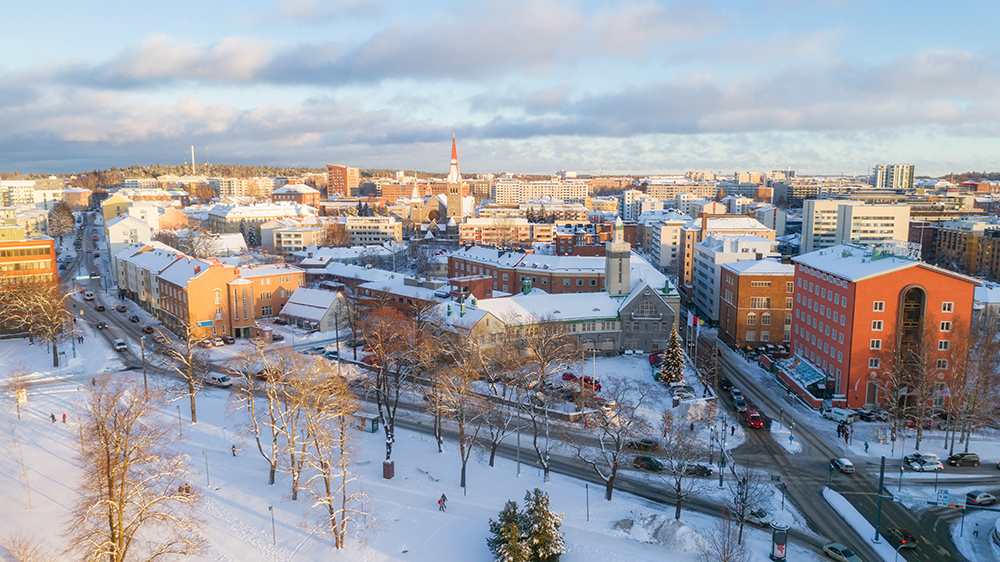Agreements between State and cities to speed up innovations in carbon reduction, digitalisation and wellbeing

The State has concluded agreements with 16 urban areas to strengthen innovation activities. The objective of the agreements is to build innovation ecosystems, in other words, to intensify cooperation within networks, strengthen key competences and increase effectiveness of RDI activities. The content of the agreements is based on the local strengths of urban areas and they relate to comprehensive and current topics of carbon reduction, digital technology, and wellbeing and health.
The ecosystem agreements between the State and cities were signed in connection with the publication of the agreements on Tuesday 9 February.
“Ecosystem agreements are a good example of a functional and effective partnership between cities and the State. The agreements are important for creating new innovation-driven growth in Finland, especially now that we need growth based on a high level of competence,” says Minister of Economic Affairs Mika Lintilä.
“Local innovation cooperation networks that are managed well and utilised correctly will improve Finland’s competitiveness as a whole. The large investments and acquisitions that cities undertake in the near future can also be harnessed more effectively for RDI activities. The aim is to speed up innovations that create new international business and jobs,” Lintilä adds.
Ecosystem agreements are a long-term, joint investment by the State and cities to strengthen competence clusters. The agreements will be in force until 31 December 2027. The agreements are specific to each urban area, but in all of them, the development of networks is based on a high level of competence driven by universities.
Key strategic content of ecosystem agreements 2021-2027:
- Lappeenranta incl. Imatra: Green electrification
- Kuopio: Health and wellbeing technology, and water expertise
- Turku: Renewing industry and life sciences
- Helsinki, Espoo and Vantaa: Smart and sustainable urban solutions, wellbeing and health technology, new learning environments and digital solutions of skills development
- Oulu: Digitalisation in the changing urban environment, OuluHealth – Digital wellbeing and health solutions, and sustainable circular economy and clean solutions
- Joensuu: New business in the bioeconomy and circular economy, and photonics business
- Lahti: Carbon-neutral circular economy and sports business
- Jyväskylä: Physical activity, health promotion and wellbeing, and renewing industry
- Vaasa: Sustainable and smart energy systems
- Tampere: Sustainable industry X (SIX), buildings, energy and infrastructure, and digital health solutions
- Seinäjoki: Sustainable regeneration of the food ecosystem and intelligent regeneration of industry
- Mikkeli: Circular economy of municipal water system
- Pori: Technology metals and circular economy, and automation and robotics
- Kokkola: Battery chemistry, and circular economy and intelligent solutions supporting industry
- Kajaani incl. Sotkamo: Measurement technology and high-performance computing, artificial intelligence and data centres
- Rovaniemi: Arctic tourism, and wellbeing services of future and management of distances
On 4 February, the Government allocated EUR 5 million in national regional development funding to the urban areas for the launch of the ecosystem agreements. After the launch phase, the agreements will be financed with EU funding for sustainable urban development in 2021–2027.
Goal is to make Finland the most effective environment for experiments and innovations by 2030
Ecosystem agreements represent an example of Government efforts to make Finland the most effective environment for experiments and innovations in the world by 2030. Ecosystem agreements between the State and cities are also an integral part of the new partnership model of the national RDI roadmap, which aims to strengthen RDI cooperation between the public and private sectors.
“Finland is well-known for innovation activities and agreements like this can contribute to ensuring that such activities can continue in future”, Minister Lintilä said.
Ecosystem agreements have been prepared under the leadership of the Ministry of Economic Affairs and Employment together with the urban areas. The Ministry of Education and Culture, the Ministry of the Environment, the Ministry of Social Affairs and Health and Business Finland also participated in the negotiations. The State and cities plan to continue their joint development and active dialogue during the implementation of the agreements.
Inquiries:
Jenny Hasu, Special Adviser to the Minister of Economic Affairs, tel. +358 40 658 3510
Olli Voutilainen, Senior Specialist, Ministry of Economic Affairs and Employment, tel. +358 29 506 4919
Mika Pikkarainen, Ministerial Adviser, Ministry of Economic Affairs and Employment, tel. +358 29 506 3622
Press release 4 February 2021: Regions to receive EUR 13.4 million for sustainable growth and vitality
Press release 20 May 2020: Agreements to boost innovation to be concluded with cities
